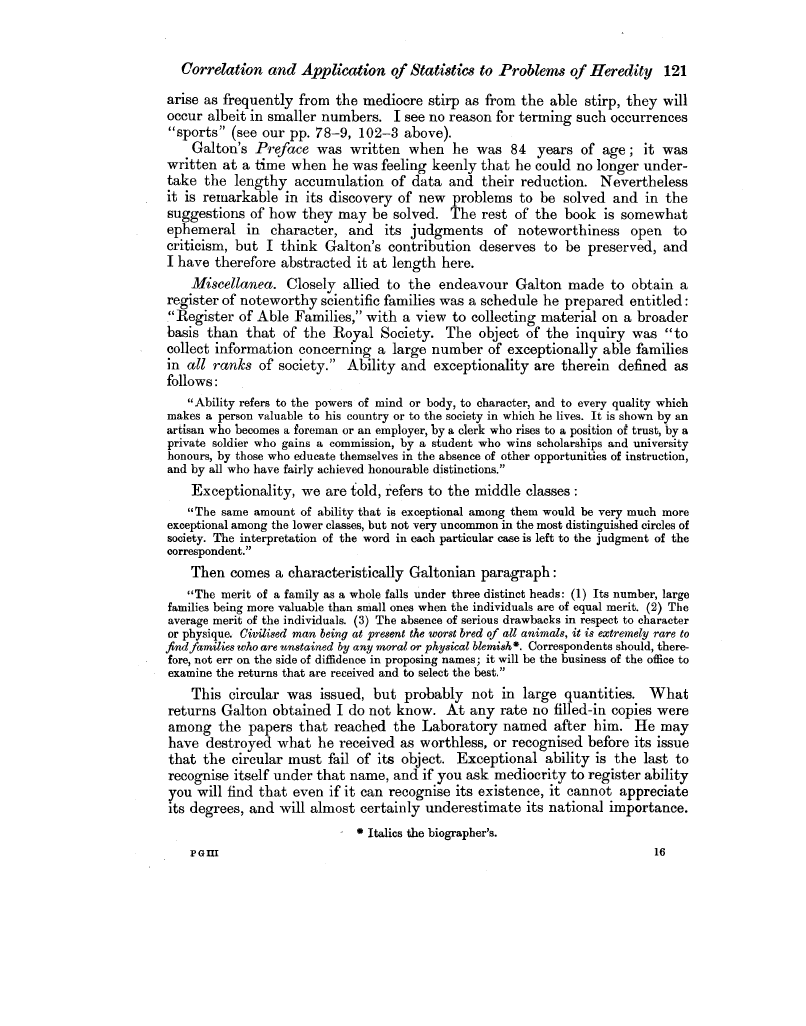| ||||||

OCR Rendition - approximate
Correlation and Application of Statistics to Problems of Heredity 121 arise as frequently from the mediocre stirp as from the able stirp, they will occur albeit in smaller numbers. I see no reason for terming such occurrences "sports" (see our pp. 78-9, 102-3 above). Galton's Preface was written when he was 84 years of age ; it was written at a time when he was feeling keenly that he could no longer undertake the lengthy accumulation of data and their reduction. Nevertheless it is remarkable in its discovery of new problems to be solved and in the suggestions of how they may be solved. The rest of the book is somewhat ephemeral in character, and its judgments of noteworthiness open to criticism, but I think Galton's contribution deserves to be preserved, and I have therefore abstracted it at length here. Miscellanea. Closely allied to the endeavour Galton made to obtain a register of noteworthy scientific families was a schedule he prepared entitled "Register of Able Families," with a view to collecting material on a broader basis than that of the Royal Society. The object of the inquiry was "to collect information concerning a large number of exceptionally able families in all ranks of society." Ability and exceptionality are therein defined as follows "Ability refers to the powers of mind or body, to character, and to every quality which makes a person valuable to his country or to the society in which he lives. It is shown by an artisan who becomes a foreman or an employer, by a clerk who rises to a position of trust, by a private soldier who gains a commission, by a student who wins scholarships and university honours, by those who educate themselves in the absence of other opportunities of instruction, and by all who have fairly achieved honourable distinctions." Exceptionality, we are told, refers to the middle classes "The same amount of ability that is exceptional among them would be very much more exceptional among the lower classes, but not very uncommon in the most distinguished circles of society. The interpretation of the word in each particular case is left to the judgment of the correspondent." Then comes a characteristically Galtonian paragraph "The merit of a family as a whole falls under three distinct heads: (1) Its number, large families being more valuable than small ones when the individuals are of equal merit. (2) The average merit of the individuals. (3) The absence of serious drawbacks in respect to character or physique. Civilised man being at present the worst bred of all animals, it is extremely rare to find families who are unstained by any moral or physical blemish*. Correspondents should, therefore, not err on the side of diffidence in proposing names; it will be the business of the office to examine the returns that are received and to select the best." This circular was issued, but probably not in large quantities. What returns Galton obtained I do not know. At any rate no filled-in copies were among the papers that reached the Laboratory named after him. He may have destroyed what he received as worthless, or recognised before its issue that the circular must fail of its object. Exceptional ability is the last to recognise itself under that name, and if you ask mediocrity to register ability you will find that even if it can recognise its existence, it cannot appreciate its degrees, and will almost certainly underestimate its national importance. Italics the biographer's. ram 16
|